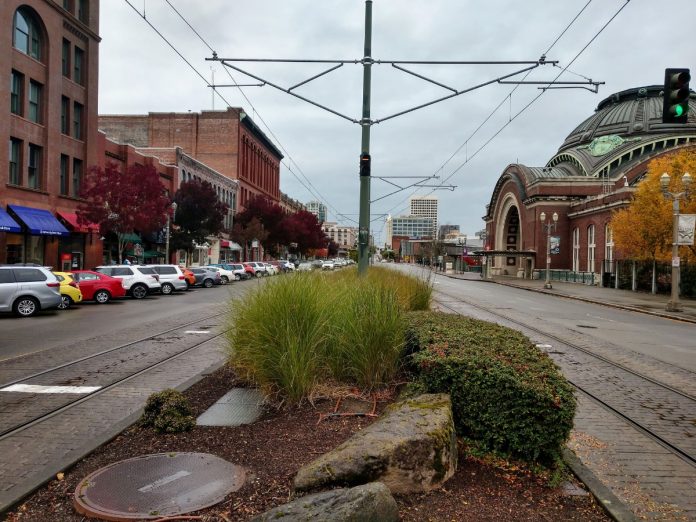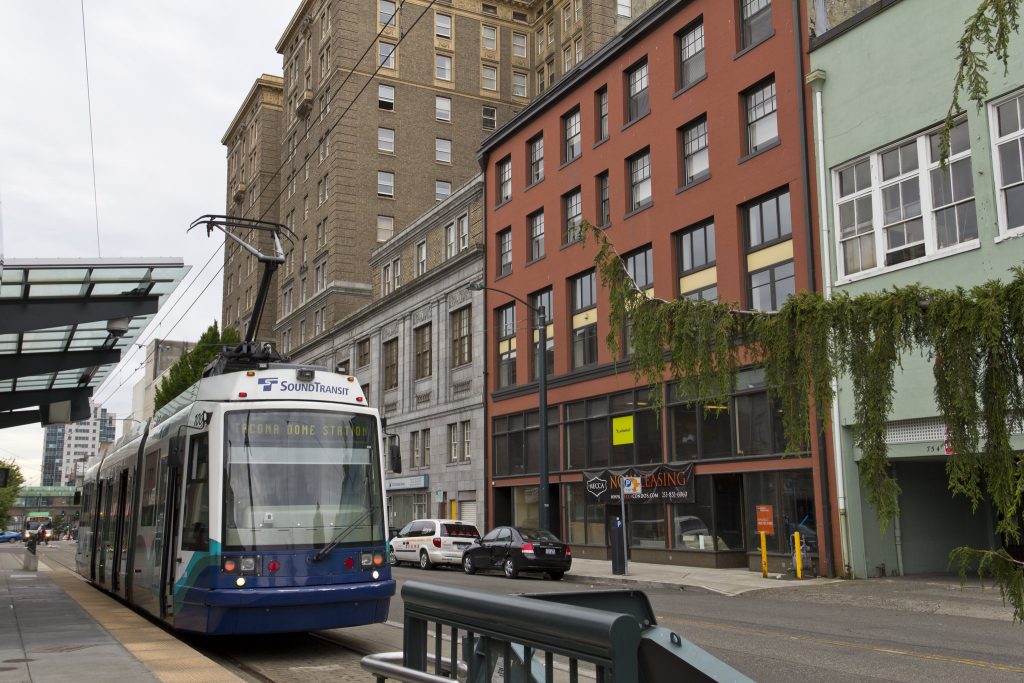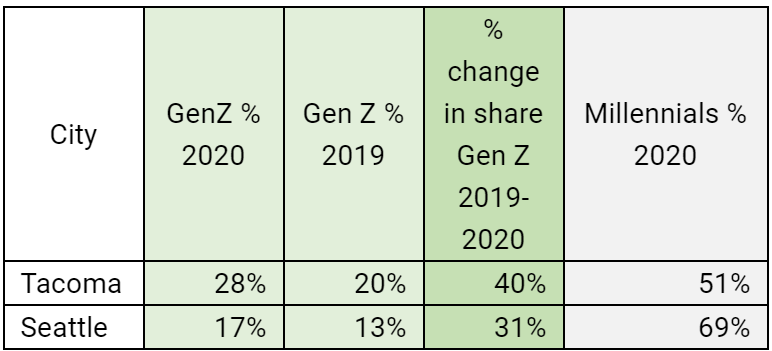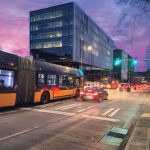
You would have to be quite old to remember when it was cheaper to live in the city than the countryside. It’s been a long time since that second-floor bachelor pad in Chinatown was more bargain basement than that cottage up the hill, and by now we’d be hard pressed to find both for less than a thousand a month. Still, city life was trendy, and Millennials embraced it — especially here in Seattle. Studio apartments filled with plants quickly became as Millennial as #vanlife, kale smoothies, and avocado toast. You’ve probably seen photos floating around online and stared in envy. “Wow, I could totally live there,” you might have thought.
Except by the time you reached the bottom of the seemingly endless Instagram posts Millennials had grown up. Many got mortgages in the suburbs, especially as the pandemic caused some to rethink apartment living while working from home or center city housing costs while times are tough.
Gen Z has been growing up too. Throughout 2020, the share of renters born after 1997 jumped 36% compared to 2019, according to a RentCafe study (RentCafe is a nationwide apartment listing service). It seems that these new renters are choosing smaller, cheaper towns over the big cities — a sharp turn from the footsteps of their Millennial counterparts.
Greenville, North Carolina (pop. 93,400) was the top choice for “Zoomers” nationwide in 2020, seeing 84% more Gen Z renter applications than the previous year. Tacoma clinched the top spot in Washington with a 40% increase. Some 28% of Tacoma’s renters were Zoomers by years’ end, compared to just 17% in Seattle (though that was up significantly from just 13% the previous year). And when it comes to the cities with the highest shares of Gen Z renters in the state, Lakewood, Spokane Valley, and Kennewick take the lead — some 33% of renters in these small towns are Zoomers.
- Zoomers or Gen Z is defined as people born from 1997 to 2012, spanning ages 8 to 24 currently.
- Millenials are defined as people born between 1981 and 1996, spanning ages to 24 to 40.
- Generation X is defined as people born between 1965 to 1980, spanning ages 40 to 56.
- Boomers are defined as the generation born between 1946 to 1964, spanning ages 56 to 75.
Millenials made up a whopping 69% of Seattle renters in 2020, according to RentCafe’s analysis. In Tacoma, that figure was 51% in 2020, down from 56% in 2019. Together Zoomers and Millenials compose 86% of the renter market in Seattle and 79% in Tacoma.
There’s quite a few reasons for this change, and Covid is a big one. Nicholas P. Dempsey, Associate Professor of Sociology at Eckerd College, says that the big draw of big cities — job opportunities — are just as easily accessed anywhere else thanks to work-from-home options.
“Young people launching careers head to where jobs are in the different industries that interest them, and those still tend to locate in the biggest cities,” Dempsey said. “If firms allow many of their employees to work from home after the pandemic, college grads might just choose to skip the move to the big city, and stay in the college town that they’ve grown to love.”
Like friendships, closer connections with parents also play a big role in keeping recent graduates anchored in small towns. And increasingly, Zoomers are just moving in with their parents or getting an apartment nearby to embrace a tighter intergenerational bond.

Smaller cities like Tacoma also offer Gen Z with a much easier path to financial stability. While Seattle rents have fallen over the course of the pandemic (and they’re already starting to rebound), they’re still far above Tacoma’s. In her press release statement, Professor Jill Ann Harrison from the University of Oregon explains that cities with a lower cost of living are simply less risky for a generation starting out on their own; with many Zoomers crippled by astronomical college debt and facing a tough job market, it only makes sense to put down roots where it’s more affordable. Plus, it costs far less capital to start a business in smaller cities (Tacoma included), and with a smaller, more closely-knit market it’s easier for Zoomers to make a meaningful impact.
Though this could just be a reflection of ongoing trends. Now is primetime for the older Gen Z cohort to be graduating college and entering the workforce, so it makes sense for the Zoomer share of the rental pie to be increasing (not to mention that people generally stop renting and start buying as they get older). With small town living too seeing a renewed interest nationwide, it might just be that Zoomers are skipping the city living stepping stone and jumping straight to the suburbs, small cities, and towns.
If that’s the case, Seattle could be in trouble. With the pandemic having already put many perks of city life on the chopping block, it’s more important than ever for big cities to combat their high costs of living to make people come back. Seattle’s comparatively high Millennial renter share could very well be pushing potential Zoomers out, a grim reminder for the city to fill in its massive affordable housing shortage so it can be affordable and accommodative for everyone. After all, renting isn’t permanent, and when the pandemic subsides, cities could very likely see a resurgence in popularity if prices drop. Time will tell.
Or maybe none of this matters. Maybe after a while, we Zoomers will just embrace #vanlife in droves like those before us. Not all those who wander are lost, you know…
Brandon Zuo is a high schooler and enjoys reading about urban planning and transportation. They enjoy exploring the city on the bus and on their bike. They believe that income and racial equality should be at the forefront of urban development. Brandon Zuo formerly wrote under the pseudonym Hyra Zhang.


